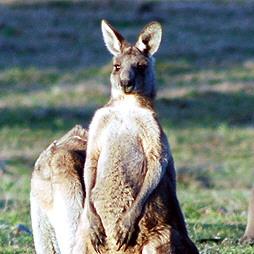Posted 18 May 2009

Kangaroos have far less impact on the environment than sheep (credit: Bob Beale)
A comparative study of the water and energy requirements of kangaroos and sheep has given new weight to calls for the increased use of roos for everything from eco-tourism to human and pet food consumption.
Dr Adam Munn from the University's School of Veterinary Science spent weeks tracking kangaroos and recording their energy requirements, concluding that kangaroos have far less of an impact on the environment than once thought.
"We found that the kangaroos were consuming only around 13 per cent as much water per day as sheep," said Dr Munn. "A sheep's diet consists mainly of saltbush. Sheep feeding on saltbush will drink around 12 litres of water a day, as opposed to kangaroos, which drink around 1.5 litres per day," said Dr Munn.
The study also shows that kangaroos consume around one-third of the energy of sheep and therefore have much less of an impact on the environment.
The researchers used isotopes to compare the animal's energy requirements which were introduced into the animals, with a blood sample taken after 10 days. The animal's energy levels were then calculated by comparing the quantity of remaining.
"This showed that the kangaroo will turn over around 5000 kilojoules per day, with sheep turning over around 15,000," said Dr Munn.
As kangaroos have significantly lower energy requirements than sheep, this indicates that they need less food than sheep, thus their environmental impact is lower.
"With climate change, most rangelands are going to need to look at diverse options for land management for sustainability," said Dr Munn. "It is conceivable that we could drought proof the environment more efficiently by using kangaroos for eco-tourism without the environmental impact once thought, or increase the use of kangaroo human or pet food consumption."
Source: University of Sydney News

Professor Andy Baker features in American Water Resources Association ‘Water Resources Impact’, September 2020 edition.

The Connected Waters Initiative (CWI) is pleased to welcome Taylor Coyne to its network as a postgraduate researcher. If you’re engaged in research at a postgraduate level, and you’re interested in joining the CWI network, get in touch! The CWI network includes multidisciplinary researchers across the Schools of Engineering, Sciences, Humanities and Languages and Law.

The Grand Challenge on Rapid Urbanisation will establish Think Deep Australia, led by Dr Marilu Melo Zurita, to explore how we can use our urban underground spaces for community benefit.

On the 21 August 2020, CWI researchers made a submission to the National Water Reform Inquiry, identifying priority areas and making a number of recommendations as to how to achieve a sustainable groundwater future for Australia.

Results published from a research project between the Land Development Department (LDD) Thailand and UNSW has demonstrated how 2-dimensional mapping can be used to understand soil salinity adjacent to a earthen canal in north east Thailand (Khongnawang et al. 2020).